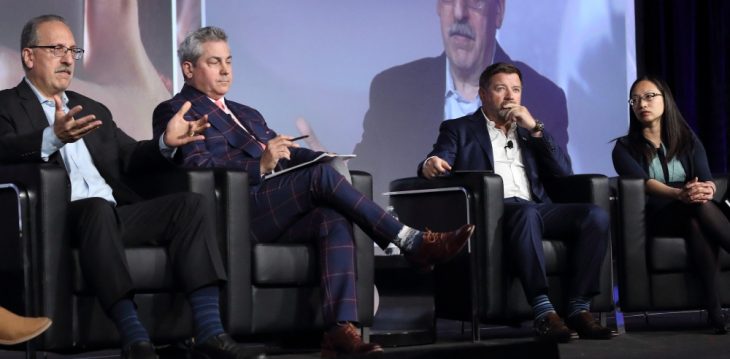
TORONTO – Telecommunications companies had better drop their deceptive and bullying consumer sales practices before they gets smacked by Ottawa, the head of a consumer group warned industry leaders.
"This will continue to be a political issue for you and it may trip up your other businesses because it resonates with the public," John Lawford, executive director of the Public Interest Advocacy Centre (PIAC), said Monday during a panel discussion on improving customer experience at the annual Canadian Telecom Summit.
"You guys are too big and too important now to think that what you do for business is your only consideration."
His comment comes after the telecom industry sales practices suffered a series of bad blows in the past 12 months. It started with a number of CBC reports saying some agents pressure and don't fully explain to customers what they are buying. That prompted Innovation Minister Navdeep Bains last June to order the CRTC to investigate.
In February the Commission concluded that some in the industry engaged in "unacceptable … misleading and aggressive retail sales practices … [that] are harmful to Canadian consumers, in particular those who may be vulnerable due to their age, a disability, or a language barrier.
What was surprising from the investigation, he added, "is what a bubble this industry is in that they didn't know they were the number one water cooler topic in the country, that people hate their telecom provider because you guys promise one price and then you change it."
“Wait until a political party decides to make you guys the poster child for what's wrong with corporate Canada and wins an election on that.” – John Lawford, PIAC
"If you think it's tough now," Lawford said of consumer anger and suspicion of telcos, "wait until a political party decides to make you guys the poster child for what's wrong with corporate Canada and wins an election on that.
"This whole thing could have been avoided because everybody knows the industry has a problem: Don't charge people one thing and then change the price."
Since releasing its report the CRTC and the government continue to consider whether to implement new consumer protections, while at the same time encouraging the industry to clean up its act.
Lawford wasn't the only panelist who was down on the country's biggest Internet and wireless carriers. Janet Lo, vice-president of privacy and consumer legal affairs at independent ISP TekSavvy Solutions complained about "bait and switch" tactics her company hears about from unhappy customers looking for a new provider.
She even had a personal encounter with one salesperson in Ottawa who – not knowing who she works for – told her Bell Canada would never give TekSavvy access to its high-speed fibre optic network, as well as what she saw as questionable pricing. "This is insane," she said.
Howard Maker, the commissioner of complaints for telecom services, tried to stay neutral, saying the industry and companies are so big it's hard to expect firms to have changed business practices in three months since the CRTC report. He only has to deal with complaints if customers can't come to a resolution on their own with providers.
However, he acknowledged that the biggest bucket of complaints are around what was broadly called disclosure of issues such as when telcos could raise prices or throttle bandwidth. "Some complaints are so simple we can't figure out why they came to us," he said, suggesting issues could have been resolved by telcos with some common sense.
All of which put the squeeze on Tony Geheran, executive vice-president and chief customer officer at Telus, and the only panelist from one of the big three carriers.
“Are you going to tarnish or punish those who are operating to their best endeavors because of the bad few?" – Tony Geheran, Telus
Telus, has the lowest churn (customers leaving) than any other wireless carrier, he pointed out, suggesting that's at least some evidence his company’s sales practices aren't objectionable, but he complained the industry was being broadly tarred. "Certainly there are examples of bad practices and I think those should be held to account, but where those examples don't exist, are you going to tarnish or punish those who are operating to their best endeavors because of the bad few?"
Geheran also complained about the "hypocrisy" of some critics who want incumbent carriers to have the lowest prices, while at the same time invest heavily in infrastructure, and add more customer support staff rather than increase online help tools and not give up mailing out monthly paper bills. Technology has to be embraced, he said, arguing an increasing number of Canadians no longer want paper bills.
He also insisted, despite complaints about direct pressure on some consumers, that carriers need to be able in some communities to continue to send sales reps door-to-door.
Last year Ontario banned door-to-door sales for home heating, vacuum and air conditions systems, Lawford replied, and if the telco industry doesn't watch out it will be next.
He said the industry should either clarify or ban pricing promotions, forbid raising fees for "administrative purposes," clear up the right to impose penalties for data overages, give people who want the choice of getting monthly bills on paper and stop charging for customer service.
"If you suck it up then you've got a good argument when someone says, ‘You treat your customers badly,' you can say, 'No we don't – look at what we just did,'" added Lawford.
Pictured are, left to right, Howard Maker, John Lawford, Tony Geheran, Janet Lo. Photo by Howard Solomon.


